US Will Never Tie Israel’s Hands Against Iran - Biden Assures Lapid
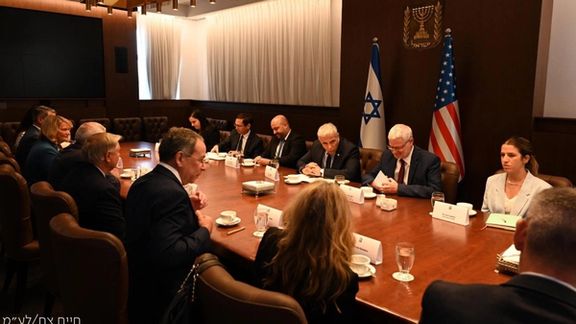
US Ambassador to Israel Thomas Nides said Monday that President Joe Biden has assured Prime Minister Yair Lapid that Washington will never tie Israel’s hands against Iran.

US Ambassador to Israel Thomas Nides said Monday that President Joe Biden has assured Prime Minister Yair Lapid that Washington will never tie Israel’s hands against Iran.
Reiterating the pledge to stop the Islamic Republic from acquiring nuclear weapons, Nides said at a press conference in Jerusalem that “We understand the aggression of Iran,” adding that “[Biden] was very clear to the prime minister in that belief.”
“We also would like a diplomatic solution, but only under the conditions the president has laid out with our European colleagues. There are many gaps and conditions that have to be reached before we would actually agree to an agreement,” Nides said.
He made the remarks as a congressional delegation, including Robert Menendez, the chairman of the Senate Committee on Foreign Relations, is visiting Jerusalem. Menendez told a press conference that Biden has pledged to submit any agreement on Iran’s nuclear program to Congress for review.
He added that a review would be conducted by his committee and that there would be a vote on such a deal, noting that he was unsure if the outcome of that vote “would meet the threshold under the law to nullify the agreement.”
Republican Senator Lindsey Graham of South Carolina, also part of the congressional group, said the delegation was briefed by Mossad chief David Barnea, who will be in Washington this week to attend closed-door classified meetings of House and Senate intelligence committees.
“The Mossad leader’s trip to the US will focus on tightening security and intelligence coordination with the Americans surrounding the Iranian nuclear issue,” read a Sunday statement from Lapid’s office.

Liz Truss’ record of pragmatism in politics has not stopped some commentators thinking or hoping she will take a harder line than predecessor Boris Johnson.
In September 2021, Truss, just appointed foreign secretary, sat down quietly with her Iranian counterpart Hossein Amir-Abdollahian on the sidelines of the United Nations general assembly. Truss reportedly assured Amir-Abdollahianthat London was serious about repaying the £400 million debt owed by Britain since the 1970s for undelivered weapons.
Truss had told senior civil servants on promotion to the foreign office days earlier, moved by Prime Minister Boris Johnson from international trade secretary, that her “number one priority” was securing the release of three Britons detained in Iran – Nazanin Zeghari-Ratcliffe, Anoosheh Ashoori and Morad Tahbaz.
Richard Ratcliffe, husband of Zeghari-Ratcliffe who was freed along with Ashoori March 2002, praised Truss in a July newspaper article. “Despite me camping angrily on her doorstep, and our sometime fractious relationship, she delivered on her promise to us to get Nazanin home,” Ratcliffe wrote. “After five foreign secretaries, that matters. She did the one thing everyone knew would work: she paid the UK’s debt.”
Not everyone was pleased. Mike Pompeo, who as secretary of state under President Donald Trump launched maximum pressure as the US left the 2015 Iran nuclear deal condemned the £400 million ($460 million) payment as “blood money.”
Truss has a long record of pragmatism. President of the Oxford University Liberal Democrats when a student, she was opposed the UK leaving the European Union (EU) during the 2016 referendum but later became a ‘Brexiteer.’
‘Not dealing with a perfect world’
Pressed in a House of Commons committee in June, Truss fielded a question on human rights in the Arab Gulf states. “We are not dealing with a perfect world,” she said. “We are dealing in a world where we have to make difficult decisions…”
As foreign secretary, Truss has worked along with the Biden administration in line with the British and European policy of reviving the 2015 nuclear deal, the JCPOA (Joint Comprehensive Plan of Action). Along with French and German counterparts, she has increasingly placed the onus to Iran to make compromises as the talks have become US-Iran contacts, mediated by the European Union, since Vienna multilateral meetings between Iran and six world powers paused in March.
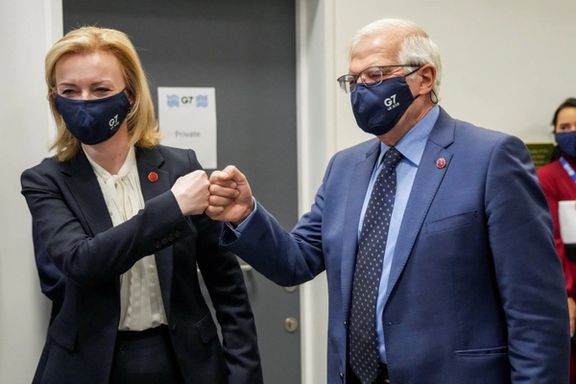
Hopes for the talks have risen and fallen in recent weeks. In comments made Monday to reporters in Brussels, Josep Borrell, head of EU foreign policy, said he was “less confident today than 28 hours before on the convergence of the negotiation process,” and that without convergence, “the whole process is in danger.”
Borrell: Nuclear talks ‘in danger’
While France and Germany, and the European Union, may look to Truss to hold the UK’s current position, Monday’s news that Truss had been elected leader of the British Conservative Party and therefore prime minister designate, prompted celebrations among many conservative commentators.
“To leave the past few years of Chamberlain Conservatism and reclaim Churchill’s mantle, Truss must act boldly from day one to break the FCO’s [foreign office] hold on No 10 [the prime minister’s residence],” tweeted Richard Goldberg, senior advisor to the Federation for Defense of Democracies. In calling Johnson an ‘appeaser,’ Goldberg referred to Neville Chamberlain, British prime minister 1937-40, who explored options for stopping Nazi Germany short of war.
‘No need to tread on eggshells’
Nile Gardiner, director of the Margaret Thatcher Centre for Freedom at Heritage Foundation and frequent contributor to Fox News, wrote August 31 that Truss would challenge the Biden administration over aspects of US foreign policy, “such as its weakness on Iran.” Truss, wrote Gardiner, would “not be afraid to take on the liberal establishment at home and abroad.”
The Daily Telegraph ran a leader August 28 headlined ‘Truss must bloc Iran deal,’ which it said was “likely to offer at best nothing more than a trivial delay to the ayatollahs’ atomic ambitions, even as it unlocks cash likely to fund attacks against the very Western governments which sign up.” With Zeghari-Ratcliffe freed, the paper opined, “there is no need to tread on eggshells.”
Towards the end of the Conservative leadership election, United Against Nuclear Iran speculated in the US that her rival Rishi Sunak’s “domestic emphasis on Britain’s finances might sway him toward a pro-trade rationale and attendant support for the JCPOA…A Sunak government would suggest a continuation of his former boss’s [Boris Johnson] Iran policy: ongoing support for the JCPOA as a ‘least bad’ option to restrain and possibly moderate Iran in the long term.”
Among other JCPOA opponents, Israel Prime Minister Yair Lapid congratulated Truss as “my new friend, a true friend of Israeli.” The Jerusalem Post, highlighting Lapid and Truss overlapping as foreign ministers, cited “sources close” to the Israeli prime minister that Truss “has shown an understanding of the threat Tehran poses to the Jewish state and is closer to Israel’s view on Iran’s prevarications in the talks.”
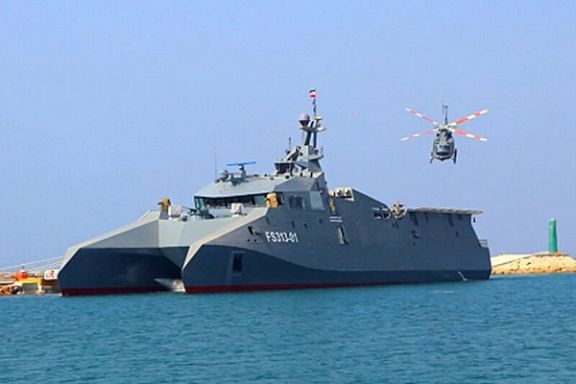
Iran’s Revolutionary Guard (IRGC) navy has added three new military vessels to its fleet including a patrol combat warship named after Qasem Soleimani, killed by a targeted US air strike in 2020.
Addressing the unveiling ceremony in the southern Iranian port city of Bandar Abbas on Monday, Major General Mohammad Bagheri, Iran's chief of staff for the Armed Forces, said the Soleimani patrol combat warship is a multi-hulled watercraft that can carry choppers and can unload strike speedboats and vertical take-off and landing (VTOL) drones, adding that it is the first Iranian military vessel equipped with air defense missiles with a vertical launching system that can fire mid- and short-range missiles.
He claimed that the hull of Shahid Soleimani-class missile corvette is made with radar-evading stealth technology construction techniques, meaning that it has a very low level of radar cross-section thanks to its shape.
In addition to Bagheri, the IRGC Chief Commander Major General Hossein Salami, Commander of the IRGC Navy Rear Admiral Alireza Tangsiri and a number of other high-ranking military officials, commanders and state officials attended the ceremony.
The IRGC Navy also delivered Shahid Rouhi and Shahid Dara high-speed and missile-launching assault boats.
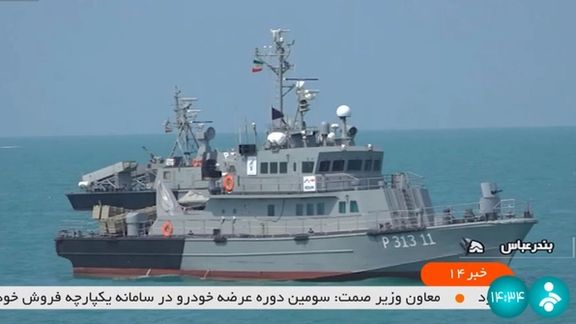

In July, the United States Naval Institute published satellite photos showing that Iran was constructing new stealth missile boats on the island of Qeshm in the Strait of Hormuz in the Persian Gulf.
On Sunday, two surface-to-surface missile launchers, one logistic vessel and one Ghadir-class submarine were added to the South Fleet of the Iranian Army Navy of the country.
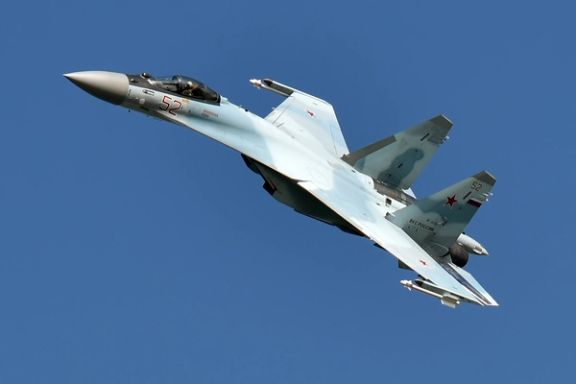
The Commander of the Iranian Army’s Air Force has confirmed that the Islamic Republic is seeking to purchase Sukhoi Su-35 fighter jets from Russia.
Brigadier General Hamid Vahedi said on Monday that buying Su-35s is on the agenda of the Air Force but the country has no plans to buy Sukhoi Su-30s, both developed from Sukhoi Su-27 which was a Soviet-origin twin-engine supermaneuverable fighter aircraft. Su-35 is single-seat but Su-30 is a two-seat, multi-role fighter.
According to reports, the Army’s Air Force needs at least 64 aircraft, 24 of which will come from Egypt's order which remained undelivered due to US pressure on Cairo.
Tehran-Moscow deals for drones, satellites and other aviation equipment have been increasing in recent months. Russia not only launched a satellite for Iran in August, but its personnel were also reportedly sent to train on Iranian military drones to use in Ukraine.
As tensions remain high between Washington and Tehran, the United States military said earlier in the day that it flew a pair of nuclear-capable B-52 long-distance bombers over the Middle East in a show of force, the latest such mission in the region as tensions remain high between Washington and Tehran.
The bombers took off from the Royal Air Force base at Fairford, England, and flew over the eastern Mediterranean, the Arabian Peninsula and the Red Sea on Sunday in training missions together with Kuwaiti and Saudi warplanes. Three Israeli F-16 fighter jets accompanied the American bombers “through Israel’s skies on their way to the Persian Gulf,” the Israeli military said, describing the country’s cooperation with the US military as key to “maintaining aerial security in Israel and the Middle East.”
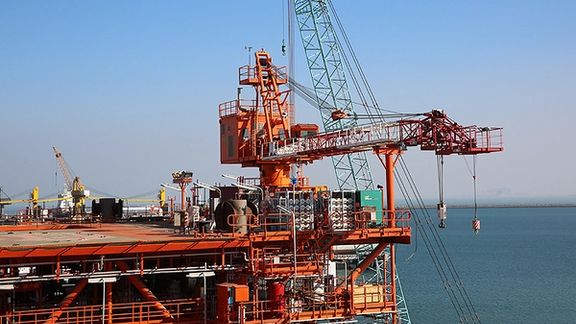
As Iran claims it can help Europe with its energy crisis, a new report shows Iranian industry lost $7 billion last year due to shortages of gas and electricity.
Amid nuclear talks with the West, Iran has hardened its position in recent days and government officials as well as its media have been suggesting that Europe is facing a winter energy shortage that Iran can help alleviate if a deal is reached and US sanctions lifted.
But the relatively independent Shargh newspaper in Tehran has published a report based on official statistics saying that shortages of gas and electricity cost Iranian businesses billions of dollars in losses in 2021-2022.
The loss equals 10 percent of Iran’s oil and non-oil exports that generate desperately needed foreign currency.
The government facing both a natural gas shortage and inadequate electricity generation decided not to reduce supplies to homes, which was common during the last years of the former administration. Instead, industries were deprived of electricity in peak summer months and gas in the winter.
Iran’s petrochemical sector needs natural gas to operate, and they sustained losses because of shortages. The other export-oriented sector, the steel industry needs a lot of electricity, and some plants were intermittently idle in the past 15 months.
Shargh quoted figures from the energy ministry saying that electricity imports from neighboring countries increased by 51 percent in June-July 2022, compared with the same period last year, while exports decreased by 60 percent.

Iran holds the world’s second largest natural gas reserves, but its energy shortage is mainly due to two self-made problems, emanating mostly from its confrontational foreign policy that deprives the government from income and investments.
Iran’s gas production is gradually falling as natural pressure in its South Pars fields is dropping and it needs technological help from Western energy giants to build larger platforms with stronger pumps to get the gas out. This in turn needs either partnership deals or Iranian cashinvestments to the tune of $50 billion.
But because of its long-running confrontation with the West, primarily the United States, and its nuclear program seen as a serious threat, Iran has not been able to benefit from Western technology and investments. Recently, it is trying to import gas from Russia.
The other serious issue is insufficient electricity generation capacity, which is also largely due to lack of efficient technologies and money for investments. Domestic demand for gas and electricity has been rising, while production has been falling.
Lack of money, price controls and bad planning have also prevented the development of solar energy, which is suitable for a country with more than 300 sunny days in the year.
The rising demand for energy is due to extremely low rates for domestic consumers, which essentially amounts to subsidies that have been in place since the 1980s. The Islamic Republic has been reluctant to erase the subsidy that amounts to more than $50 billion a year because of its closed economic system run by the government.
As the government controls the energy markets and prices, offering very low prices to producers, there is little incentive to invest in power generation, including solar energy.
With an economic crisis prevailing since 2018 when the United States withdrew from the 2015 nuclear agreement and imposed sanctions, it is much harder for the government to reduce energy subsidies. When the government modestly raisied gasoline prices in November 2019 it led to nationwide anti-regime protests in which security forces killed at least 1,500 people.
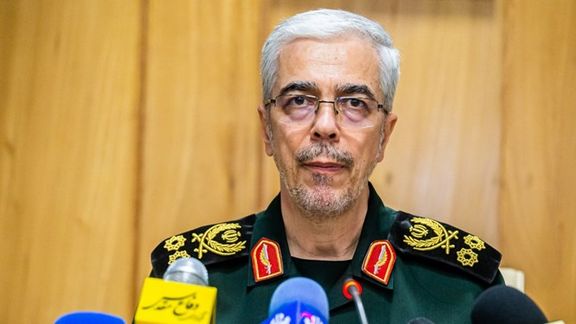
Iran's most senior military commander says the "enemies" endanger the safety of navigation by launching and sending small unmanned reconnaissance maritime drones.
Major General Mohammad Bagheri, the chief of staff for the Armed Forces of the Islamic Republic, made the remarks on Monday referring to a series of encounters between Iranian and United States naval forces last week.
"Enemies are trying to compensate for the reduction of force in the Middle East by creating new units," he said, adding that “They endanger maritime security by dispatching small unmanned surveillance drones, but the armed forces' response to vessels wandering in open waters will be decisive."
He also criticized Israel joining the United States Central Command (CENTCOM), calling it a ‘threat’ for Iran. “We do not tolerate the presence of the Zionist regime," Bagheri said, noting that "We will not make any compromises regarding the rights of the Iranian nation and the security of our seas and lands,"
Iran seized and released two American sea drones in the Red Sea on Friday. Later in the day, US officials reported that Iran returned the two captured maritime drones after being confronted by US destroyers but the unmanned vessels were missing their cameras.
On Tuesday, the US Naval Forces Central Command said that the US Navy prevented a support ship from Iran’s Revolutionary Guard’s Navy -- named Shahid Baziar -- from capturing an unmanned vessel operated by the US 5th Fleet in the Persian Gulf.
Iran’s tough military tone is coupled with its hardening of diplomatic posture in the ongoing talks to revive the 2015 nuclear agreement, the JCPOA.